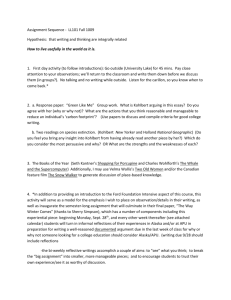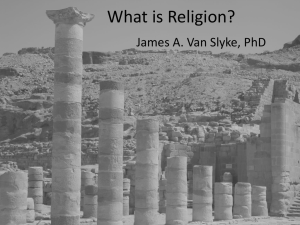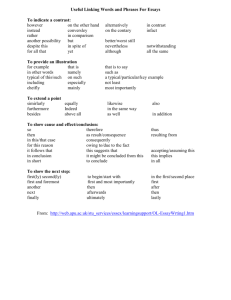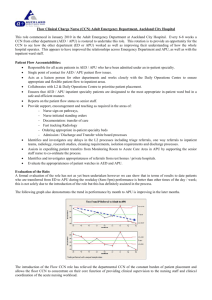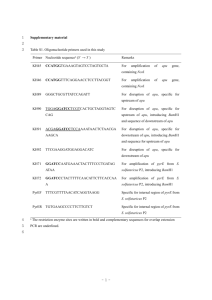Call for paper word - Azusa Pacific University
advertisement
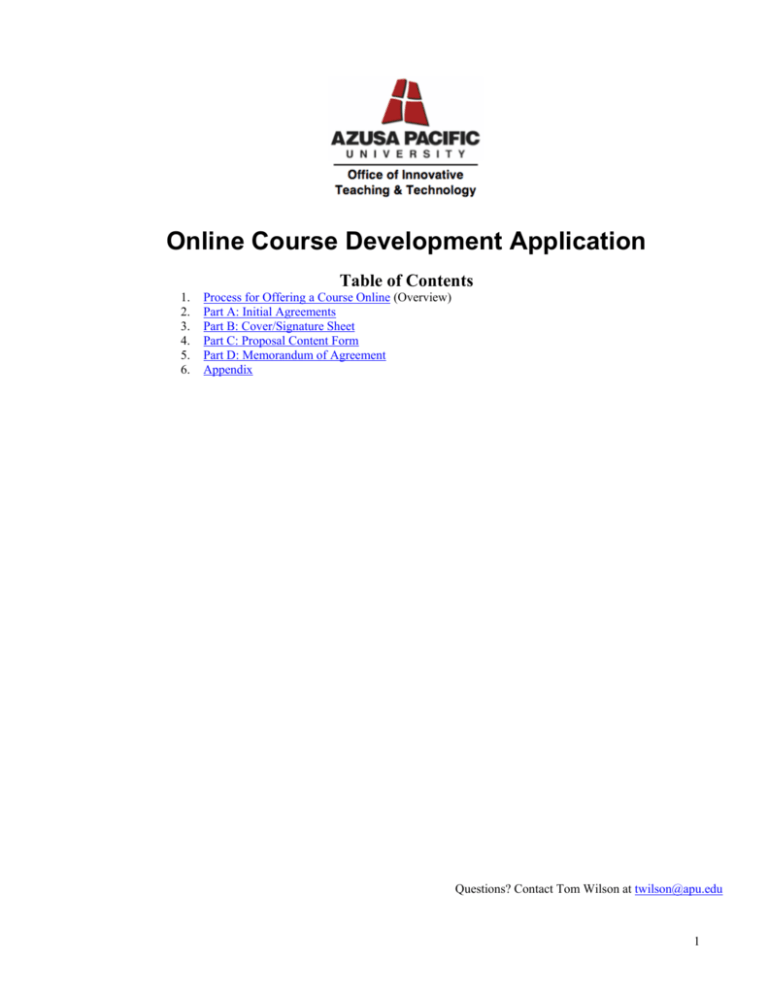
Online Course Development Application Table of Contents 1. 2. 3. 4. 5. 6. Process for Offering a Course Online (Overview) Part A: Initial Agreements Part B: Cover/Signature Sheet Part C: Proposal Content Form Part D: Memorandum of Agreement Appendix Questions? Contact Tom Wilson at twilson@apu.edu 1 O NLINE D ISTANCE EDUC ATION PR OPOSAL Process for Offering a Course Online Step 1: Department submits ITT Application and Syllabus to ITT. • • • • Application contains all department approvals/signatures when submitted. Documents submitted to Tom Wilson, twilson@apu.edu. ITT converts syllabus to online format. Department and ITT communicate back-and-forth until details are finalized. Step 2: ITT approves application and submits documents to OCS. • Subject Matter Expert (SME) will: o Gather all materials before Step 5. o Complete Online Faculty Training before course launches. Step 3: OCS submits documents for various approvals. • • OCS communicates with the department and may request additional information. Each approving entity meets at different intervals; therefore, approval times vary depending on when the application is submitted. Step 4: OCS notifies ITT when course is approved for development. Step 5: ITT works with the Subject Matter Expert (SME) to develop (build) the course in Sakai. Step 6: After dept. approves course in Sakai, ITT releases SME payment. Questions? Please contact: Tom Wilson Director of Online Learning Office of Innovative Teaching and Technology Center for Teaching, Learning, and Assessment Ext. 5039 twilson@apu.edu C O N T E N T : M A Y A 20, 2002 - FORMAT U Z U S A P A C I F I C U N I V E R P D A T E S I T Y : S E P T 2013 - 2 O NLINE D ISTANCE EDUC ATION PR OPOSAL ONLINE DISTANCE EDUCATION COURSE DEVELOPMENT AGREEMENT PART A: INITIAL AGREEMENTS This is an application to develop a high quality, interactive, web-based delivery of a particular course. The course will be delivered primarily via the World Wide Web. Please see the memorandum of understanding for information on issues related to distance education and a description of priority courses. Initial Approval The dean, chair and program director formally agree with the Office of Innovative Teaching and Technology (ITT) on the following: Course o o o o o o Course name, content, length, etc. Agreement on delivery date and approval of costing for development The course proposed for transformation to the Web Distance Education format must be an existing APU course. The course should show evidence of a Christian perspective and worldview within the course content. The course must be consistent with the mission and essence statements of APU. The course should incorporate multiple elements of distance learning on the web, not a simple electronic delivery and reception of assignments The online course should be equivalent in scope and sequence to the conventionally taught course Faculty o o o o o Commitment of release time and responsiveness of SME and Chair The faculty member has at least a minimum level of expertise in the area of technology; including being able to send and receive messages via e-mail, and is able to modify documents in word processing. The faculty member must be qualified by disciplinary expertise and experienced in the traditional delivery of their courses. It is expected that the faculty member will be provided with and participate in the training for the transfer and/or adaptation of current materials for web based delivery. Please see the attached Memorandum of Understanding Service Level Agreement ITT From approval of budget and start date, a delivered product in 45 working days for a 5 or 9 week course, and 60 working days for a 15-17 week course; CELT will provide faculty development and services to train and equip the SME and faculty in the delivery of the course School The appointment of a Subject Matter Expert (SME) with the role of providing content and oversight on pedagogy for 3 to 5 hours a week. The SME is expected to be able to respond to communications from CELT within a 24 hour time frame The SME is expected to be the same person who will be appointed as the first faculty instructor for this course The SME will be available for three consultations of approximately 4 hours at the initiation of the project, a middevelopment review and the final handover of the course The chair of the department will represent the Dean and will be expected to review progress every two weeks, reviewing the course online with the SME. The chair of the department representing the Dean will approve the final product C O N T E N T : M A Y A 20, 2002 - FORMAT U Z U S A P A C I F I C U N I V E R P D A T E S I T Y : S E P T 2013 - 3 O NLINE D ISTANCE EDUC ATION PR OPOSAL ONLINE DISTANCE EDUCATION COURSE DEVELOPMENT AGREEMENT PART B: COVER/SIGNATURE SHEET NAME OF FACULTY: DEPT./SCHOOL: TELEPHONE NUMBER(S): ______________________________________ ______________________________________ ___________________________________ Please include the official APU course number and catalogue description of the course. COURSE NUMBER ________________________ UNITS ___ COURSE TITLE ______________________________________________ COURSE DESCRIPTION ____________________________________________ _________________________________________________________________ COURSE TO BE FIRST TAUGHT ONLINE IN WHICH OF THE FOLLOWING TERMS AND YEAR: (Please place an X next to one) ____Fall ____Spring ____Fall I ____Spring I ____Fall II ____Spring II ____Summer ____Summer I ____Summer II _____ 2013-2014 1. 2. _____2014-2015 ____May Intercession ____August Intercession _____2015-2016 Are you, (Subject Matter Expert), a full-time faculty member? Length of time at Azusa Pacific University: _____ Faculty compensation for development: Payment for the development of the course is a stipend of $1,000: Memorandum of Understanding I have read and agree to the Memorandum of Understanding for the Development and Delivery of Courses for the WEB ___Yes ___No ____________________________ Signature* of Faculty 3. Approval of the Department Chair I hereby approve of the above course being developed as a Web based distance learning course to be carried out by the above faculty member. ____________________________ Signature* of Chair 4. Approval of the Dean I hereby approve of the above course being developed as a Web based distance learning course to be carried out by the above faculty member. ____________________________ Signature* of Dean 5. Approval of Director of Online Learning I hereby approve of the above course being developed as a Web based distance learning course to be carried out by the above faculty member. ____________________________ Signature* of Director of Online Learning (ITT). * An email verifying approval is accepted in lieu of a hard copy signature. The printed email will be stored as backup. C O N T E N T : M A Y A 20, 2002 - FORMAT U Z U S A P A C I F I C U N I V E R P D A T E S I T Y : S E P T 2013 - 4 O NLINE D ISTANCE EDUC ATION PR OPOSAL ONLINE DISTANCE EDUCATION COURSE DEVELOPMENT AGREEMENT PART C: PROPOSED CONTENT INSTRUCTIONS: Please type your answers in this form. Answers should be brief; Part C should not exceed 4 pages. I. Purpose and Objectives. State the purpose of putting this course into WEB format, including the precise educational objectives and benefits of using this medium. (Insert response here.) II. Student Population: Describe the student population you are anticipating will take this course. Are they ___current undergraduate, ____current graduate, ___potentially new students? Describe the uniqueness of this population that they will be best served using this method of instruction. (Insert response here.) III. Context of the Course. ___This is a single course offering not part of a group of courses to be offered on the Web. ___This is a course that is part of a group of courses that will be offered over the Web. What are the other courses? ___This is a course that is is part of a program leading to a degree, certificate or credential. ___This is a continuing education course. ___This is a course that is currently taken by APU students as a correspondence course and transferred in. Discuss briefly the relationship of this course to other courses in your department or school. Describe the uniqueness of this course that would warrant putting it on the Web in light of its relationship to other courses and programs. (Insert response here.) IV. Methodology. Please describe the current format of the material for this course. A. Percentages 1. The percentage of material for this course on digital/computer medium is _________. 2. The percentage of material for this course on paper is ____________. 3. The percentage of material for this course stored in brain cortex only is ____________. B. Estimate the amount of your secretarial time needed to make material available for transfer into Web format: (Insert response here.) C. Describe areas of the course that lend themselves to being taught through this format: (Insert response here.) D. Describe areas of the course about which you have some concern about putting it into Web format: (Insert response here.) E. Please place an X next to the options you are considering for inclusion in this course. (See Appendix for list of standard elements that are featured in all new courses.) ***Assistance is available from ITT for creating all of these elements.*** Instruction 1. ___Multimedia course introduction from instructor 2. ___Multimedia lectures for each week 3. ___Text-based lecture and lecture notes for each week 4. ___Downloadable study guide 5. ___Synchronous video sessions in Adobe Connect or Google Hangout or other resource. (Offered as a voluntary “virtual face-to-face” option, bi-weekly or as preferred by instructor.) 6. Other: C O N T E N T : M A Y A 20, 2002 - FORMAT U Z U S A P A C I F I C U N I V E R P D A T E S I T Y : S E P T 2013 - 5 O NLINE D ISTANCE EDUC ATION PR OPOSAL Learning Activities 1. ___Self-directed learning exercises and independent study 2. ___Small group collaboration 3. ___Online journaling 4. ___Student-produced multimedia 5. ___Student-hosted discussion forums 6. ___Other: (please specify) Resources 1. ___Customized webliography for each course - providing direct links to Internet sites. 2. ___Articles, handouts, and documents 3. ___Publisher slides 4. ___Internet videos 5. ___Other: (please specify) Assessment 1. ___Automated quizzes and exams within Sakai. 2. ___Online portfolios 3. ___Written assignments 4. ___Projects 5. ___Other: (please specify) V. Course Objectives. List the learning outcome objectives for the course. What do you expect the students to learn or be able to do at the end of the course? (Insert response here.) VI. Evaluation. Describe your plan for formative and/or summative evaluations that are currently used for this course. How will you adapt this form of evaluation to fit this format? (Insert response here.) VII. Selected Bibliographical References. Evaluate the type of reference material used for this course. The percentage of hard copy reference material for this course is _________. The percentage of Web based reference material for this course is ____________. Do you have material to be used in this course for which you have copyright concerns? If so, what are they? (Insert response here.) VIII. Requirements for faith-based or faith integration: Describe ways in which a Christian perspective and worldview will be embedded within the course content. How is the mission statement of APU carried out in the context of this course in this medium? (Insert response here.) IX. Qualifications of the applicant to complete the project: Please include a one-page vitae and/or listing of relevant activities related to this course. Include information about your level of expertise in technology. ____ I use e-mail on a regular basis. ____ I use word processing for producing class information or material ____ I am able to find my way around the Web. ____ I have created personal web pages or pages related to my course. C O N T E N T : M A Y A 20, 2002 - FORMAT U Z U S A P A C I F I C U N I V E R P D A T E S I T Y : S E P T 2013 - 6 O NLINE D ISTANCE EDUC ATION PR OPOSAL ONLINE DISTANCE EDUCATION COURSE DEVELOPMENT AGREEMENT PART D MEMORANDUM OF UNDERSTANDING For the Development and Delivery of Online Courses for Distance Instruction NAME OF FACULTY: DEPT./SCHOOL: ___________________________________________ ___________________________________________ Please include the official APU course number and catalogue description of the course. COURSE NUMBER COURSE TITLE ________________________________ UNITS ___ ___________________________________________ PURPOSE. Azusa Pacific University provides Internet-based education through the development of online courses by course developers in the Office of Innovative Teaching and Technology (ITT). The purpose of this agreement is to provide for the compensation of Azusa Pacific University faculty members who take part in this project for the time and effort spent both in developing the content for, and teaching, the high quality, interactive courses to be offered by APU. Participants will develop and teach courses for which they are qualified by academic discipline and experience. This webbased instruction program (the “Program”) is initially intended to involve the transfer of existing course materials into a new format, however, it may support the development of new courses. Faculty participation will be governed by the terms of this agreement. Each faculty member that agrees to participate does so with the understanding that this will call for a high level of trust, commitment and energy on the part of both faculty and administration. PRIORITY COURSES: The first priority is to develop online programs that will serve other populations than are being served by APU today. The second priority courses are those that are selected for strategic purposes from current APU programs. These may be for serving students from multiple locations, courses in high demand but not able to be offered due to lack of classroom availability. Online courses will also be assigned a designation for a review cycle for one, two or three year reviews. This will be based on how quickly the content material for the course changes for that discipline. FACULTY COMPENSATION FOR DEVELOPMENT: A faculty member (the “Participant”) that completes development of a course will be compensated for this work by a stipend of $1,000. APU would take out the usual state and federal salary deductions. Faculty shall be compensated after the development of the particular online course undertaken by them is complete in its online format. Courses shall not be offered until fully developed. FACULTY DUTIES, EXPECTATIONS AND ASSISTANCE IN COURSE DEVELOPMENT: The development of the Online course is a collaborative effort on the part of ITT and the Participant. ITT will provide consulting and online course development services as well as training for Participants. A course developer curriculum specialist from ITT will be assigned to the development of that course. Participants will be expected to function as content experts and have their full course materials, which shall be the equivalent of conventionally taught courses, available and ready at the time development commences, and to fully participate in the development in consultation as a content expert. During the development period, Participants will be expected to work on their course materials and presentations, to attend all sessions and take part in all evaluations and interaction sessions provided, and to actively evaluate their course objectives. It is expected that the initial training may be a combination of individual and/or group sessions. Participants will be expected to use their best efforts to prepare online course presentations suited to the unique medium of web-based education. Toward this end, they will be expected to implement as many elements as reasonably possible found on the “Course Options” listed in Section IV, Item E of this document. Course materials submitted by Participants will put the into final Web-based delivery format of the Sakai authoring system. Participants understand that the material in that Internet format is intended only for use by APU students who have registered for the online course. Following the development period, Participants will be expected to continue preparing for the online instructional use of the course materials, following the requirements and guidelines for web delivery as outlined in the development. C O N T E N T : M A Y A 20, 2002 - FORMAT U Z U S A P A C I F I C U N I V E R P D A T E S I T Y : S E P T 2013 - 7 O NLINE D ISTANCE EDUC ATION PR OPOSAL Participants shall have the same responsibility and right to update online courses as they would for equivalent conventionally taught courses, within the guidelines established by the technical parameters for online courses as developed by ITT. Options outside of this system will be considered by and are at the discretion of the ITT. This agreement is not intended to modify or extend any other teaching contracts or employment agreements, or create any expectations beyond its specific purpose of promoting the development of web-based online courses. Participants’ rights in this agreement are personal and may not be assigned, and this agreement may be modified in writing only. FACULTY DUTIES, EXPECTATIONS AND ASSISTANCE IN COURSE DELIVERY: Delivery of an Online course requires a different perspective and expectations than teaching a face-to-face class. Creating a sense of community with communication among students and faculty online is a high priority. Each course shall feature threaded discussions in which faculty and students are regular participants. Faculty agree to respond promptly to email communication, creating a normal 24 hour turnaround time and not more than 48 hours. Students shall be informed in the beginning of the course of the expected turnaround time. INFRINGEMENT OF OTHER’S RIGHTS: Each Participant will make every effort to follow legal procedures when copyrighted materials of others are to be incorporated into the Web-based course. The Participant will not put copyright material on the Web-based course without either obtaining prior written consent of the author(s), or giving proper credit for sources and using them within the guidelines and limitations of the Fair Use statute (Section 107 of the Copyright Act of 1976, as amended). REQUIREMENTS FOR FAITH INTEGRATION: Each Participant agrees to intentionally embed a Christian perspective and world view within their Web-based course content, and to make every effort to assure that the course materials are consistent with APU mission and Essence Statement. RIGHTS AND OBLIGATIONS TO TEACH COURSE: Each Participant preparing a course for web-based delivery agrees to teach the course through web-based delivery at least twice after the delivery of the course. The Dean of the School will determine the teaching assignments for all courses, including the web-based courses under his/her purview. OWNERSHIP OF THE COURSE: The online courses developed pursuant to this agreement shall be owned by APU. The online format and structure shall be developed and maintained on the Web by ITT for the benefit and use of APU. The ownership by APU of course content, however, and the substantive material from which the course was developed shall be non-exclusive, and the Participant shall also have the ownership right to use, modify, edit and publish that source material outside the context of the APU online course. Participants shall be given appropriate recognition for their original content within the course. Participants agree to cooperate with APU in such protection and registration of intellectual property rights to the course material as may be required. COURSE MINIMUMS AND MAXIMUMS: During the first two semesters of an online course offering, the minimum enrollment required to begin and constitute a course shall be six students. The maximum enrollment in a single course shall be twenty students. These numbers may be adjusted for market and other considerations, and each Participant shall be kept informed of all factors that will affect course offerings. PAYMENT FOR WEB-BASED DELIVERY: Participants teaching a web-based class will receive the prevailing overload rate of pay for the number of course credits (e.g., 3,4) or will be credited for an equitable part of their full teaching load. EVALUATION: Participants are expected to participate in the development and use of evaluation tools and materials for their courses to determine appropriate attainment of educational goals for each student. Participants will evaluate, test and grade their online course students and to submit online students’ grades to APU as they would for all other students. APU will assess the ongoing effectiveness of web-based delivery from the perspective of student, faculty, School, and University, and Participants’ perspective will be important in determining the ongoing utility of web-based delivery. Participant: ________________________ ___________________________ Print name: Signature APU: ________________________ by: C O N T E N T : M A Y A 20, 2002 - FORMAT U Z U S A P A C I F I C U N I V E R P D A T E S I T Y : S E P T 2013 - 8 O NLINE D ISTANCE EDUC ATION PR OPOSAL ONLINE DISTANCE EDUCATION COURSE DEVELOPMENT AGREEMENT APPENDIX Standard Instructional Design Elements for All New Courses 1. Syllabus that meets undergraduate or graduate requirements for online courses 2. Faith integration 3. Instructor announcements 4. Discussion forums 5. Assignment submissions 6. Multimedia lectures (e.g. Sakai webcam, narrated PowerPoint, Podcasts). Assistance is available from ITT. ---END of DOCUMENT--Return to Table of Contents C O N T E N T : M A Y A 20, 2002 - FORMAT U Z U S A P A C I F I C U N I V E R P D A T E S I T Y : S E P T 2013 - 9
